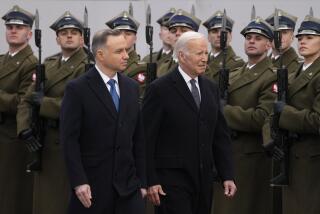U.S. Allies’ Arms Aid to Bosnia Detailed
- Share via
WASHINGTON — Arms smuggling to Bosnia and Croatia was larger and more complex than the shipments from Iran and Turkey recently acknowledged by the Clinton administration, and involved such U.S. allies as Pakistan, Malaysia, Saudi Arabia and Argentina, according to U.S. and Bosnian officials.
U.S. officials learned in 1992 that Iran had opened a smuggling route to Bosnia with the assistance of Turkey, two years before a controversial decision by President Clinton to give Croatia a diplomatic “green light” for the shipments, National Security Advisor Anthony Lake said Friday.
Bosnian government officials said that by 1993, arms or money for arms purchases also were being supplied through the Turkish pipeline by Saudi Arabia, Malaysia, Brunei and Pakistan, and that other weapons shipments came from Hungary and Argentina.
U.S. officials knew of most of the arms shipments but took no action, despite Clinton’s public support for a United Nations-sponsored arms embargo against Bosnia, Croatia and the other nations of the former Yugoslav federation. That policy marked a break with the George Bush administration, which strongly protested when an Iranian plane flew into Zagreb in September 1992 with 4,000 assault weapons, prompting Croatia to impound the cargo.
Administration officials have said that no covert action was taken to support the weapons smuggling and that U.S. actions amounted to turning a blind eye to the shipments. But several congressional committees are now investigating the arms smuggling and Clinton’s decision in April 1994 to have U.S. envoys tell Croatian President Franjo Tudjman that the United States did not object to the shipments.
Bosnian officials said the Balkan arms smuggling pipeline took shape during the fall of 1992, six months after war erupted in Bosnia-Herzegovina between the Muslim-led government and rebel Serbs, who were backed by forces and supplies from neighboring Serbia. During a visit by Bosnian President Alija Izetbegovic to Tehran on Oct. 30-31, Bosnian sources said, an agreement was worked out to open a weapons supply route to the Muslim-led government in Sarajevo through neighboring Croatia.
Croatia, which normalized relations with Iran on April 18, 1992, sent a Muslim Croat, Osman Muftic, to be its first ambassador. It was Muftic, officials said, who worked out the details of the weapons pipeline along with Omer Behmen, Bosnia’s ambassador to Iran, and Hasan Cengic, a Bosnian Muslim arms dealer who now serves as Bosnia’s deputy minister of defense.
For a while, Cengic actually based himself in Tehran as he traveled the Middle East and Asia searching for other contributions for Bosnia’s vulnerable army, which was being rolled back on almost every battlefront by the formidably armed Bosnian Serbs.
A State Department spokesman said that the administration was aware that Croatia and Bosnia were obtaining arms from Iran and other countries, including Argentina, Hungary and other sources in the former Soviet Bloc. But Washington did not once raise the issue of the purchases.
“The American decision to turn a blind eye goes back to 1993,” said Dan Nelson, an arms control specialist at Old Dominion University who was in the region in 1993 and 1994 studying the issue.
Gojko Susak, Croatia’s defense minister, corroborated that view in an interview last week. “The Americans never protested,” he said. “When they asked, we would say that our original weapons were simply hatching babies.”
Susak added that the Croatian government did not ask for a U.S. view on the smuggling in 1992 and 1993 because the United States had yet to involve itself diplomatically in solving the conflict.
But the United States became more important to Croatia after March 1994, when the Clinton administration brokered an agreement between the Bosnian government and Bosnian Croats, ending their conflict and opening the way for a renewed alliance of the two factions against the Serbs. The agreement also made possible an intensification of weapons deliveries to Bosnia and Croatia.
On April 26, a little more than a month after the Washington deal was clinched, Croatia’s president, Franjo Tudjman, asked Ambassador to Croatia Peter Galbraith whether the United States had any objections to Iranian arms shipments to Bosnia via Croatia. Two days later, Galbraith and Charles Redman, Clinton’s special envoy to the region, told Tudjman they had “no instructions” from Washington, meaning that the Clinton administration did not object to the deal.
On May 4, an Iranian cargo plane with 60 tons of ammunition and arms-making machinery landed in Zagreb for transshipment to Bosnia.
More to Read
Sign up for Essential California
The most important California stories and recommendations in your inbox every morning.
You may occasionally receive promotional content from the Los Angeles Times.













